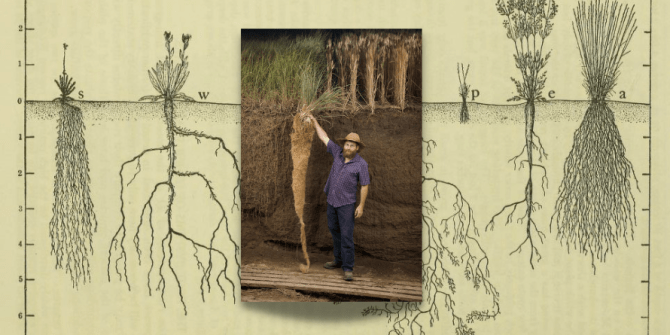Reader, I fear you've committed an agricultural act. Again. Probably just a few hours ago. As poet/farmer Wendell Berry famously pointed out, "eating is an agricultural act." Yet how many consider it so when they open the fridge or pull in the drive-thru?
The ramifications are endless. Every time you eat, you contribute to soil erosion, and, these days, fossil fuel dependence, groundwater decline and surface water pollution, declines in biodiversity, increases in climate change, the growth of agribusiness, and the list goes on. They're just the latest manifestations of an 11,000 year-long trend.
Wes Jackson, a good friend of Wendell's, calls upon us to focus not on the problems in agriculture, but the problem of agriculture. Co-founder and until his retirement the President of The Land Institute, in Salina, Wes has been working on the problem of agriculture since the 1970s. As eaters and residents of what was once "America's breadbasket," you already know that the problem of agriculture is annual grain crops.
Right?
But the perennial revolution is at hand.
In New Roots for Agriculture, his 1980 book, Wes put forth the radical idea of developing an agriculture of perennial crops, rather than annuals. Since then, he and the staff and students of The Land Institute have been studying nature's model and working on answering four questions:
Can perennialism and high yield go together?
Can a polyculture outyield a monoculture?
Can an agroecosystem sponsor its own fertility?
Can "domestic prairies" minimize pathogens, insects, and weeds?
Note those "domestic prairies." Using nature as the standard, as The Land Institute suggests, a truly sustainable agriculture would consist of crops grown in mixtures, not the monocultures we've become used to. With those crops being deep-rooted perennials, yearly tilling wouldn't be necessary. Referred to as perennial polycultures early on, the preferred term these days is Natural Systems Agriculture.
It didn't take too long for researchers to answer the first of the four natural systems questions. Botanists had long assumed that perennials and high seed yield were mutually exclusive, the theory being that energy is directed toward the plants' roots and not toward seed production. But it ain't necessarily so. The other three questions remain, until mixes of perennial crops are devised.
Progress is rapidly (for agriculture and plant breeding) being made. Decades of research, both in domesticating perennials and perennializing annuals, is paying off. The star so far is a perennial wheat that The Land has trademarked as "Kernza," bred from a perennial intermediate wheatgrass high in protein and antioxidants. Like annual wheat, it's been used in beer, whiskey, bread, cereal, crackers, brownies, and more; crafted by countless home-bakers and -brewers, big guys like Cascadian Farm and Patagonia Provisions, and even local favorites WheatFields Bakery and Free State Brewery.
Perennial rice is the latest headliner, which is seeing success after an even shorter period of development. Following initial trials in Asia, Africa, and other locations, hopes are high for this new crop. Imagine 44,000+ farmers of perennial rice in China. Imagine eight harvests over four years from a single planting. Stop imagining -- it’s happening now.
The Land Institute’s website quotes former staffer Jerry Glover on the news:
“I congratulate the authors for delivering one of the most important reports in modern agriculture,” says National Geographic Society Explorer Jerry Glover, whose work has focused on developing and using perennial crops. “I believe this… will catalyze a generation of new discoveries by scientists who have not yet been involved in pursuing perennial traits in staple grain crops. This research marks a distinct new line of possibilities for global food production.” (Jerry is the fellow pictured above comparing annual wheat and perennial wheatgrass roots. Photo by Jim Richardson.)
If you are curious about the details behind such radical, Kansas-grown notions, you're in luck. On Saturday, October 14, at 4:00, researchers from The Land Institute will be in the library auditorium, presenting updates on Kernza as well as the latest on other perennial crops that The Land Institute is working on -- rice, an oil crop based on a prairie native, sorghum, legumes, and perhaps more. We hope to have some treats or maybe some Kernza flour, so registration is requested so we can get a mouth count. I mean head count. Here's the form:
https://lawrence.bibliocommons.com/events/64ac6bc4fab24b4100e2af75
For more on The Land Institute and perennial agriculture, check out their website and these titles:
Consulting the Genius of the Place
The Restless and Relentless Mind of Wes Jackson
-Jake Vail is an Information Services Assistant at Lawrence Public Library.



Add a comment to: Nourishing Roots